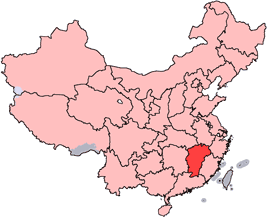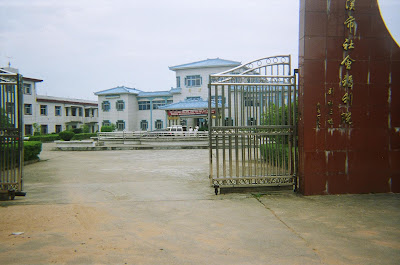 Mountains surround Jiangxi on three sides, with the Mufu Mountains, Jiuling Mountains, and Luoxiao Mountains on the west; Huaiyu Mountains and Wuyi Mountains on the east; and the Jiulian Mountains and Dayu Mountains in the south. The southern half of the province is hilly with ranges and valleys interspersed; while the northern half is flatter and lower in altitude. The highest point in Jiangxi is Mount Huanggang in the Wuyi Mountains, on the border with Fujian. It has an altitude of 2157 m.
Mountains surround Jiangxi on three sides, with the Mufu Mountains, Jiuling Mountains, and Luoxiao Mountains on the west; Huaiyu Mountains and Wuyi Mountains on the east; and the Jiulian Mountains and Dayu Mountains in the south. The southern half of the province is hilly with ranges and valleys interspersed; while the northern half is flatter and lower in altitude. The highest point in Jiangxi is Mount Huanggang in the Wuyi Mountains, on the border with Fujian. It has an altitude of 2157 m.The Gan River dominates the province, flowing through the entire length of the province from south to north. It enters Lake Poyang in the north, the largest freshwater lake of China; that lake in turn empties into the Yangtze River, which forms part of the northern border of Jiangxi.
Important reservoirs include the Xiushui Tuolin Reservoir in the northwest of the province on the Xiushui River, and the Wan'an Reservoir in the upper section of the Gan.
Jiangxi's climate is subtropical. Average temperatures are about 3 to 9°C in January and 27 to 31°C in July. Annual precipitation is 1200 to 1900 mm.
Jiangxi is the main area of concentration of the Gan varieties of Chinese, spoken over most of the northern two-thirds of the province. Examples include the Nanchang dialect, Yichun dialect and Ji'an dialect. The southern one-third of the province speaks Hakka. There are also Mandarin, Hui, and Wudialects spoken along the northern border.
Ganju (Jiangxi opera) is the type of Chinese opera performed in Jiangxi.
Although little known outside of the province, Jiangxi cuisine is rich and distinctive. Flavors are some of the strongest in China, with heavy use of chile peppers and especially pickled and fermented products.
Jingdezhen is widely regarded as the producer of the best porcelain in China.
Jiangxi also was a historical center of Chan Buddhism.
Prominent examples of Hakka architecture can be found in Jiangxi.
Near the northern port city of Jiujiang is the well-known (and expensive) resort area of Mount Lushan . Also near the city are Donglin (East Wood) Temple and Tiefo (Iron Buddha) Temple, two important Buddhist temples.Near the small city of Yingtan is the resort area Longhushan which purports to be the birthplace of Taoism and hence has great symbolic value to Taoists. The region has many interesting temples, cave complexes, mountains and villages. It is considered by many to be the best-kept secret of Jiangxi tourism.
The Lushan National Park is a UNESCO World Heritage Site since 1996.
Jiangxi is also the filming location for the fifteenth series of the American t.v. show Survivor.
The mountainous terrain and large forest coverage of Jiangxi has made it historically one of the more wild places of central China. South China Tigers have been seen as recently as fifteen or twenty years ago and projects are underway to document evidence of existing tigers, if there are any. Several mountain areas along the northern border with Hunan and Hubei are potential sites for "wilderness" preserves specifically for protecting or even reintroducing tigers.
Other wildlife, though not plentiful, are more numerous in Jiangxi than in many other developed areas of China. Numerous species of birds are common, especially around the marshes of Lake Poyang in the north. Though protected, mammals such as muntjak, wild boar, civet cats, and pangolins, are still common enough that they'll even occasionally be seen in markets for sale as game meat, or possibly even in a forest.
At the time of this posting, Goldie is waiting for us at Guixi Social Welfare Instiute. Guixi City is about 150 km from Nanchang and has a population of about 100,000. It is famous Taoism, apparently Taoism was actually founded in Guixi.
Its not an orphanage but a social welfare institution with people of all ages residing there. Its also very, very rural. Most of the babies that go for adoption are put into foster care. Foster care in a rural city like Guixi is a a way for poor rural families to supplement their income; so there is no shortage of foster care.
Before we got there ......Below is a rare photo - a view of the country side from behind the institution.


Above is the gate where she was left as a newborn.

her crib.
 Goldie with the Director of Nannies and her roommate Meagan.
Goldie with the Director of Nannies and her roommate Meagan.







